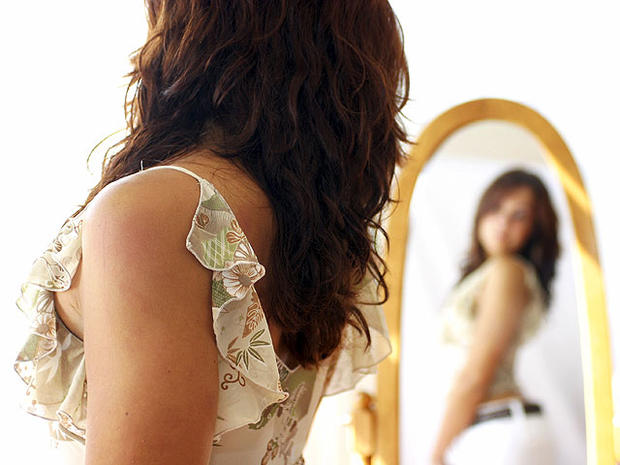Imagining trying on swimsuits worsens women's mood, study finds
(CBS News) With swimsuit season around the corner, new research finds that for women merely thinking about trying on a bathing suit may negatively impact their emotional well-being.
Previous research has focused on media images and other external factors that may contribute to body dissatisfaction in women, but the authors behind this new study wanted to focus on the role clothes play in impacting mood since they're such a big part of daily life. They were looking for the role clothing plays in "self-objectification," a theory that contends a person may internalize an outside perspective to objectify one's self.
Abercrombie bikini tops: Threat to girls' mental health?
Israeli law bans ads featuring underweight models
PICTURES: Retouched or not? Tool spots photos' too-flawless features
The researchers did this by asking 102 female undergraduate students from South Australia to imagine themselves in clothes that differed in "revealingness" - a bathing suit or a jeans-sweater ensemble - in both private or public settings. For example, women were asked to imagine themselves trying on a swimsuit in a department store dressing room alone. In another scenario they were asked to imagine themselves walking down a beach in a swimsuit past a group of men and women who were laughing and talking.
Participants were given a questionnaire that tested for mood and self-objectification after imagining each of the four scenarios. The researchers found that women who had imagined themselves in a bathing suit were more likely to self-objectify and be in a worse mood compared with when they imagined the jeans and sweater scenarios. Interestingly, women were more likely to self-objectify when imagining being alone in a dressing room than they were when imagining being in public.
"This interesting finding emphasizes that self-objectification is indeed an internalized perspective," the researchers wrote. "The physical presence of observers is clearly not necessary." The study is published in the May 1 issue of Sex Roles.
The researchers wrote dressing rooms can contain potentially objectifying features like mirrors and bright lights that "demand" women engage in close evaluation of their body.
"The results suggest that clothes can have significant consequences for women's well-being," wrote the researchers, led by Dr. Marika Tiggemann, a psychologist at Flinders University in Adelaide, Australia. "There is no doubt that trying on clothes is one important component that contributes to clothes shopping becoming a negative experience for many women."
Tiggemann told HealthPop in an email that while it may be difficult to not look in a mirror, she suggests women refrain from engaging in social comparison with other women (or the media) and take up activities that emphasize body function - such as sports - rather than appearance. She said such measures to combat negative body image may help prevent eating disorders and depression for women.
Dr. Rachel Marsh, assistant professor of clinical psychology in psychiatry who specializes in eating disorders at Columbia University in New York City, told HealthPop she thinks self-objectification contributes to eating disorders along with myriad of other factors, such as neurological predisposition to develop anorexia or bulimia.
"If self-objectification and the media were the only factors involved, every girl out there would have an eating disorder," Marsh told HealthPop. She is currently recruiting girls ages 12 to 19 for a Columbia study that looks at the neural factors that contribute to the development of eating disorders in teens.
Marsh thinks people with such a propensity for an eating disorder or another condition called body dysmorphic disorder may become more sensitive to self-objectification.
"We see that a lot in girls with eating disorders, they're more affected looking at images of skinny girls and girls in bikinis," she said.
Marsh said parents could help deter the negative mood associated with self-objectification in the way they react to their teenagers' body image concerns.
"Parent involvement is so important, Marsh said. "If you see a child self-objectifying or concerned about their shape or weight, parents need to be attuned to that. So many girls hide these problems before they spiral out of control.

